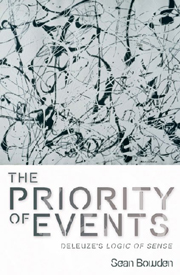Book contents
- Frontmatter
- Contents
- Acknowledgments
- Abbreviations
- Introduction: The Ontological Priority of Events in The Logic of Sense
- 1 The Stoics – Events and Sense
- 2 Leibniz – The Static Ontological and Logical Geneses
- 3 Lautman and Simondon – Problematic Ideas and Singularities
- 4 Structuralism – Structure and the Sense-Event
- 5 Psychoanalysis – Dynamic Genesis
- Conclusion
- Bibliography
- Index
2 - Leibniz – The Static Ontological and Logical Geneses
Published online by Cambridge University Press: 12 September 2012
- Frontmatter
- Contents
- Acknowledgments
- Abbreviations
- Introduction: The Ontological Priority of Events in The Logic of Sense
- 1 The Stoics – Events and Sense
- 2 Leibniz – The Static Ontological and Logical Geneses
- 3 Lautman and Simondon – Problematic Ideas and Singularities
- 4 Structuralism – Structure and the Sense-Event
- 5 Psychoanalysis – Dynamic Genesis
- Conclusion
- Bibliography
- Index
Summary
Deleuze's philosophical relation to Leibniz has in general been downplayed in the secondary literature. Deleuze's major, pre-Difference and Repetition influences are frequently cited as Nietzsche, Bergson and Spinoza, and that these figures are constant touchstones for Deleuze is undeniable. Nevertheless, in his 1968 Spinoza book it is clear that, in certain respects, Deleuze reads Spinoza through Leibniz. It is also clear that Leibniz is a major reference in ‘The Method of Dramatization’, which is an early summary of the major themes of Difference and Repetition. In the text of The Logic of Sense, which was published one year after Difference and Repetition, Spinoza is not mentioned at all, and Bergson is cited only once. Leibniz, on the other hand, features prominently in the highly important ‘Sixteenth Series of the Static Ontological Genesis’, as well as in the ‘Twenty-Fourth Series of the Communication of Events’ where he is heralded as ‘the first important theoretician of the event’ (LS, 171). Similarly, in the much later text, The Fold: Leibniz and The Baroque, Leibniz is affirmed as having implemented ‘the second great logic of the event’, after the Stoics and before Whitehead. It is thus not unlikely that Deleuze sees himself as a direct, philosophical descendent of Leibniz when he maintains in a 1988 interview that he has tried in all his books to discover the nature of events.
- Type
- Chapter
- Information
- The Priority of EventsDeleuze's Logic of Sense, pp. 56 - 94Publisher: Edinburgh University PressPrint publication year: 2011



